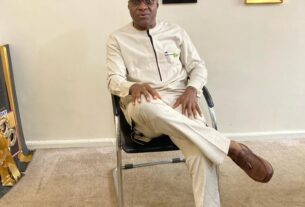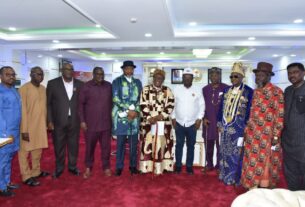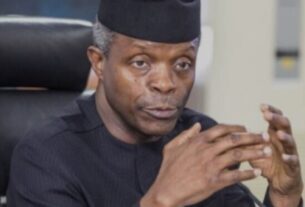By Umunna Kalu
Dr Anthony Ubani, Executive Director, FixPolitics, in this encounter with select journalists, speaks on the vision of the organization, the urgency for Diaspora voting, need for a new constitution that will pave way in rebuilding the Triangular pillars of democracy.
Ubani argued that the political class has captured and compromised all the institutions of democracy including the judiciary.
He spoke on other critical issues.
Excerpt
Let’s know the vision of FixPolitics of which you are the Executive director?
The mission at FixPolitics is to elevate the office of the citizen to its rightful place in our nation and develop a political class of servant leaders, those that will be accountable to the people. We focus on rebuilding the Triangular pillars of democracy by building a productive, informed and motivated and actively engaged electorate to demonopolise and rebalance power relations between the electorate and the political class.
For us the TPD which is needed in our politics are: one, an engaged and empowered electorate, two, a values-based political class that demonstrably leads with Character, Competence and Capacity, three, a reformed constitutional, electoral, political and economic environment..
FixPolitics is a citizens-led movement conceived to structurally fix our broken politics that has impeded good governance both in Nigeria and other African countries. It is not partisan, not affiliated or in favour of any political party.
The core values of FixPolitics are captured in the acronym FIRES of Justice, Fearlessness, inclusive, resilience, enlightenment, service and justice. We also have the school of politics, policy and governance (SPPG) which has the goal of transforming politics in Nigeria and in the rest of Africa. In Senegal, as I speak, the president just appointed a student of our SPPG to head an oil producing refinery as the Director-General.
FixPolitics will be in Zimbabwe, Kenya and Ghana before December this year. We have an African-wide vision but what we said is charity must begin at home, so we decided to start first in Nigeria here and from here we launch out to other African countries.
You have been pushing for Diaspora voting and the need to embrace it in the constitution. Are you worried that there has been a delay?
Of course, we are worried that it is taking long as it has become the practice in most countries of the world in including African countries. Speaking globally now, Diaspora voting, the first time there was a record of Diaspora voting was way back in 52BC, so you know that’s a very long time ago, before Christ and that was in Rome during the reign of Emperor Augustus. You know what the Roman Empire was doing before its collapse. They were taking territories here and there, taking colonies all over the place they conquered. So whenever they took new colonies, the first thing they do is that they set up their Senate there and they will be in-charge.
But the Senate that is set up made up of Romans will still have to vote in elections in Rome. So what they now do is that before elections the Senate in each colony will cast their votes, and when they cast those votes they will seal it then send it back to Rome before the election in Rome. When the election in Rome is then conducted they will open it and count them together. That was the first recorded event known as Diaspora voting, some people call it absentee voting, some call it external voting, they call it all kinds of names but they mean the same thing. It is when your citizens in a country are outside the country and they are given the right where ever they are to still vote.
Fast forward to 1862 in the United States of America in a State called Wisconsin, then they were having the civil war and then the soldiers in the union had to go and fight but they also had to retain their right to vote. So they came up also with what they called absentee voting. Those soldiers that were fighting in the civil war can cast absentee ballot. Then in 1968 in the same United States, they now said that they will then make it possible that civilian, Army, where ever you are outside the country, when elections come, you can cast what is known today as absentee ballot.
Now let’s come to the present time. Over 115 countries in the world have one form of system or the other which allows their citizens that are abroad to be able to vote in elections. This over 115 countries includes at least over 40 African countries; we have 54 countries in Africa and over 40 of them have one system of Diaspora voting or the other that enable their citizens where ever they are to vote.
So, that means we have a little bit of over 10 African countries remaining to subscribe to Diaspora voting and guess who is the giant in that list..Nigeria, that has refused to embrace what is now a universal practice around the world.
Now to make it more interesting to you, these African countries have not only embraced Diaspora voting but they have gone a step further because there are 2 things to Diaspora voting: countries like Mozambique, Tunisia, Algeria, Cape Verde, and a couple of others have gone to the second level which is now giving their citizens abroad the legal right to participate directly in governance in the country. What does that mean? They have seats in parliament and in different places. For instance, you have some of these countries that will say…ok, all of you in the Diaspora, we make you a district, your district is supposed to produce, let’s say, 3 Senators and 3 House of Representatives, so there will be elections for people in the Diaspora to seat in parliament.
This is already common in Western countries, in Portugal, France, and Italy for instance. The practice is simple: equal universal suffrage, in other words because my brother Adamu is living in Ghana does not mean that he should forfeit his fundamental right to exercise his right to vote. Remember that voting is a fundamental right, so when you deny any citizen their franchise, it’s a serious issue. Voting is one issue that is central to democracy everywhere, anywhere in the world. If you remove voting democracy is standing on one leg and that is why countries take it seriously, particularly in this age of technology where you simply need to perhaps, press just a button. If we have the technology we have today what stops us from embracing external voting for our citizens
Two years ago World Bank released a report that Nigerians in Diaspora has the largest remittance to any African country. They put it at an average of 24.3B dollar, which they send back to Nigeria. So Nigerians in Diaspora are a major significant force in supporting and accentuating the economy of Nigeria. The money amounts to 6 percent of GDP of the country. Now if a group of citizens are so important that they are supporting your country, making foreign direct investments, supporting in entrepreneur development, supporting in trade and commerce, in transfer of idea and knowledge and they are transferring in support of families across the country, doing all these to support your economy, then why are they not worthy to be allowed to participate in the governance of their country?
Why is it that almost 80 percent of African countries have embraced Diaspora voting and the country that calls itself the Giant of Africa has not done it? So, it’s a major form of disenfranchisement, it makes it impossible for you to talk about majority of the votes cast. If 70 percent of your population is living in Nigeria and 30 percent is outside and you disenfranchise them from the vote, it means whoever that is elected has not secured majority of the vote. I think they call it: First to pass the post. So if you want to accentuate that principle you must bring those in the Diaspora into it. It brings about ownership, it gives a sense of belonging, it helps them bring their ideas because in a democracy you want all the ideas and it helps them to participate. Nigeria has not even started with the first level which started in 52BC,
What I am saying is that denying Nigerians living outside the country the right to vote and have a say in the governance of their country is inconsistent with democratic ethos and universal trends in the global community of nations.
As I have always argued, Nigerian Diaspora represents a dynamic and vibrant community spread across the globe, comprising individuals and institutions that remain deeply connected to the Nigerian homeland and are endowed with both financial and intellectual wealth.
But despite their Nigerian citizenship and tremendous capacity to contribute positively to the Nigerian project, Diaspora Nigerians continue to be denied their fundamental right to vote and to participate in the governance of their country.
This disenfranchisement not only undermines the principles of democracy but also diminishes the potential for Diaspora engagement in shaping the policies and decisions that impact their lives and the lives of millions of Nigerians back home.
So what effort has been made so far if any?
I can tell you that it has not been a complete failure, the first time we had a major intervention in terms of Diaspora voting was in 2012, then Hon Abike Dabiri was Chairman, Committee on Diaspora in the House of Representatives. She brought together six legislators in the House of Reps and they put this bill forward. In that 2012 what happened? No interest in the National Assembly. So what happened? It was never considered and it died there.
Let me quickly add here that there are 3 basic things you need to do in the constitution. Section 77.2, Section 177.2, Section 134.2. if you amend them Nigerians in Diaspora will now get the right to vote. We are even going too far, just amend Section 77.2 and they will get the right. It is the one that simply says: For you to be registered and to vote, you must be a citizen resident in Nigeria. All we need to do is just change that clause to: A citizen above 18 resident in Nigeria or outside Nigeria. With such amendment they will have the right to vote. We need the relevant section of the 1999 Constitution to be amended to accord the right to vote to citizens above 18 who are resident in Nigeria and outside Nigeria.
Fast forward to 2022, 10 years after, civil society, FixPolitics among them in the forefront brought this agenda again during the constitutional amendment process. Guess what happened, it passed 1st reading, 2nd reading, now to go to 3rd reading which is passage, they put the vote, they were 390 members on that day and out of that 269 voted against it, 87 voted for it, 29 Senators, 58 House of Reps members. This is important, having the support of 87 members, that’s progress.
So for us as painful as that was we see movement but its too much of a slow movement for 10 years now. Our goal is to ensure that before the end of this decade, within the next 6 years we will get Diaspora voting into two-third and passed in Nigeria and how do we do that? Advocacy, campaigns, speaking to the National Assembly members to let us know what their concerns are for not passing the bill, their fears. We believe that this is what we have to do collaboratively. We will partner the media; help the media understand the issues better and why it is so important. We will also work with Diaspora partners as we have already set up a unit that is called: FixPolitics Diaspora initiative.
Are you leaving political parties out in the collaboration effort?
Political parties are part of the institutions in the collaboration. We are not taking it piecemeal and as I said, right now, we have a monopoly democracy, whether it is PDP, APC, LP, they are all the same. They have been captured, so we need to do a lot of job in political reorientation.
We will engage our legislators with a view to understanding their concerns so we can work with them to provide information, facts and data that can help alleviate those concerns and pave the way for them to support instituting diaspora voting in Nigeria.
It is very important that citizens become engaged in the affairs of their nation, citizens are empowered but beyond that a small group of people will now mobilize the electorate to hold the 3 arms of government accountable and compel them to act in the interest of Nigeria so that Nigeria does not collapse. In acting in the interest of Nigeria what is the first thing that needs to be done? Constitutional change, I didn’t say amendment. USA is about 250 years old they have only had a total of 27 amendments that is approximately 10 amendments every century. Nigeria is just about 64 years old, we have already had about 22 to 24 amendments and we are not up to a century. So you can’t keep amending and amending the constitution, that already should instruct you that there is something fundamentally wrong with this constitution.
The best thing to do is rest that constitution, call a constitutional conference of the people, that is people-led because if it is led by the political class you will come with the same result. Of course the National Assembly will facilitate the processes, that’s their job, then the people will come together and decide for themselves how to be governed. When they come together through their representatives and come up with a brand new constitution, not an amended constitution you are on your way to fixing your electoral issues, you are on your way to fixing the issue of monopoly democracy, to fixing the question of waste in governance, to fixing corruption etc, all of these blocks will begin to fall in place because now you have a constitution that belongs to the people, that the people can claim ownership. The people can defend it and hold the political class accountable.
Given the fact that the political has captured and compromised all the institutions of democracy including the judiciary, it is now necessary to mobilize Nigerian citizens to work together and collectively demand for a new constitution, political, electoral and economic restructuring of Nigeria to avert the imminent collapse of Nigeria into a failed state.








